The build-up was like no other.
For weeks before his arrival in Sydney in 1993, media at home and abroad were obsessed with Diego Maradona.
The football icon had accepted an SOS from the Argentine FA to play for the national team after they were hammered 5-0 by a Colombian side led by Carlos Valderrama and Faustino Asprilla, during South American qualifications for the 1994 World Cup in the USA. Argentina sat just one point behind Colombia in Group A. They had never lost a World Cup qualifier at home and the loss sent reverberations throughout the country amid claims of a FIFA conspiracy.
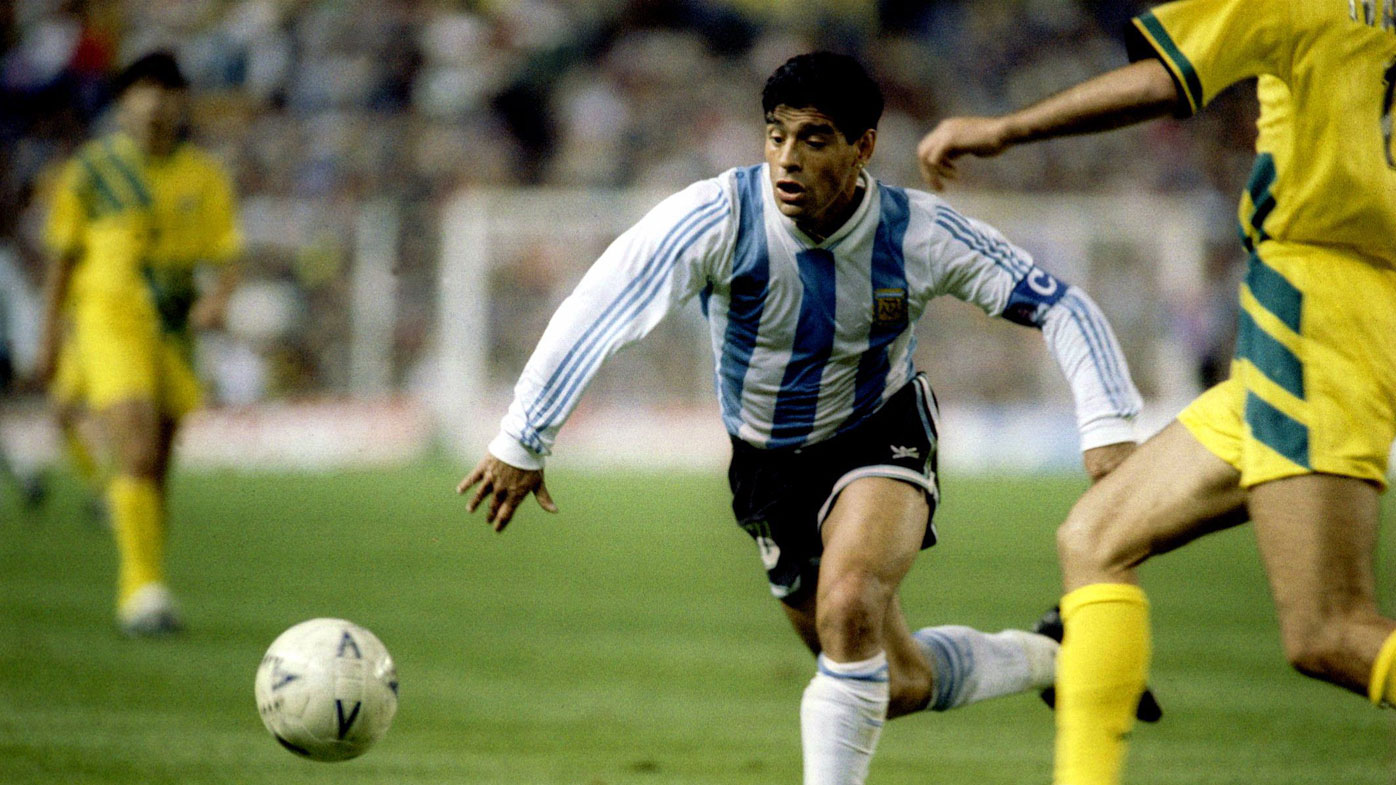
The Argentinians were in their darkest hour. They were two-time world champions and 14-time kings of South America. They'd made three of the last four World Cup finals. And yet they couldn't get past their South American neighbours who had only ever been to two World Cups and had never won a major trophy on the continent.
So officials put in a call to Maradona who had left Italy in disgrace after copping a 15-month ban for drug use in 1990.
Following the ban, Maradona was a shell of his former self. He spent a season in La Liga playing for Seville before a return to Argentinean club football. But football officials were desperate, knowing a failure to reach the World Cup finals would be a national shame they would never live down. It didn't matter the former Napoli star hadn't played for his country since the 1990 World Cup. It didn't matter he hadn't been there for any of the qualifying campaign. If anyone could guide them to the promised land it was the controversial, diminutive ace.
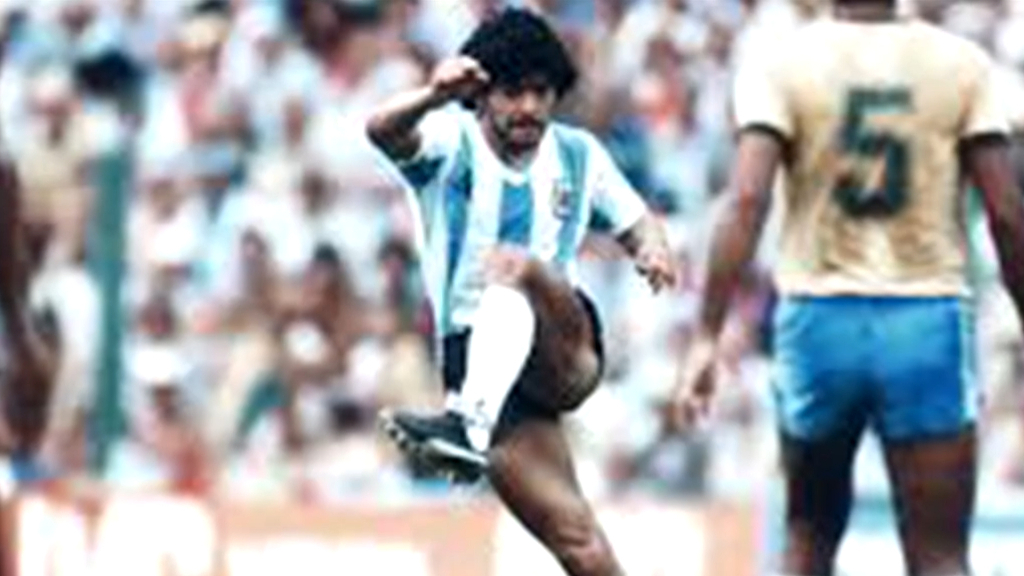
Unlike today, the qualifying path for the World Cup used to see the fifth-placed South American side face the Oceania winners, who had to play off initially against the second-placed CONCACAF country.
The Socceroos had scraped past Canada in a penalty shootout, thanks to the heroics of a young Mark Schwarzer, and were already up against it facing an Argentina side boasting big names like Gabriel Batistuta and Diego Simeone. Now they had to contend with arguably the greatest footballer of all-time.
https://twitter.com/MurrayShaw1/status/1331690468615176192?ref_src=twsrc%5EtfwThe Australian team consisted mainly of part-timers led by South Melbourne veteran, Paul Wade and coached by fiery Scot Eddie Thomson. A young Mark Bosnich was in goals after threatening to retire from international football while playing for Aston Villa. The likes of Alex Tobin, Tony Vidmar, Mehmet Durakovic, Ned Zelic, Robbie Slater and Graham Arnold were also in the side.
Yet the Australian public was understandably more fascinated by their brush with greatness knowing the Australians were virtually no hope of qualifying. However, the football legend was almost denied a visa to enter Australia because of his record of drug abuse.
"There was a big controversy over whether Australia should let him into the country," former Socceroo Craig Foster told Nine's Today this morning. "He had been out for a while and out of the Argentinian team and that's why they were struggling to qualify."
When the Argentine team finally arrived at Sydney Airport in October it was a huge event. Media from home and abroad were elbow to elbow with the local Argentine community clamouring for a chance to get a glimpse of the international superstar and their beloved team.
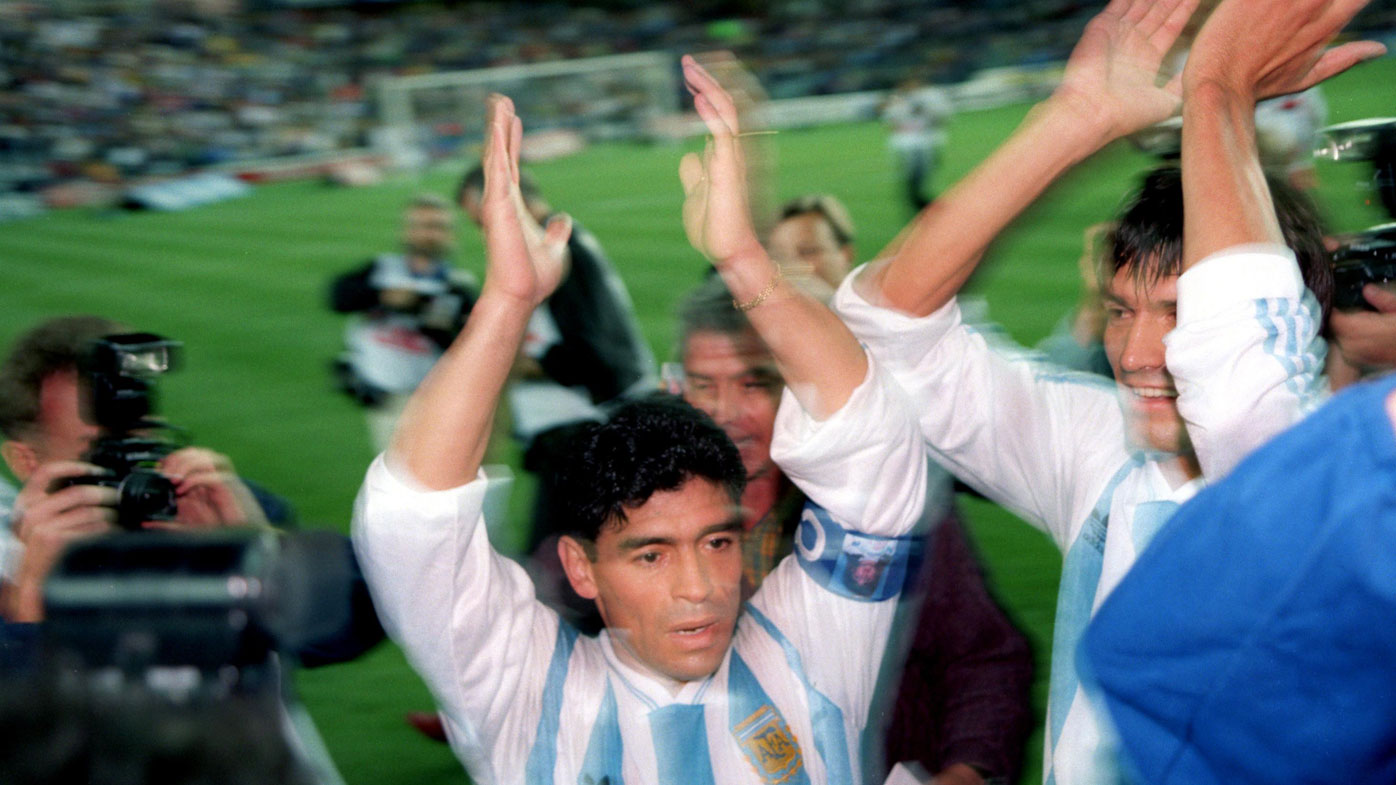
And the football legend didn't disappoint - separating himself from the group and dancing in front of the cameras as they flashed and clicked continuously, sending fans into delirium.
Having the world's greatest footballer in Sydney not only put football on the front and back pages of national newspapers, it was big news around the world. The anticipation was just as big if not bigger than a State of Origin game or a Boxing Day Test.
A then record crowd of 43,967 packed the Sydney Football Stadium to watch the Socceroos take on Argentina in the first leg of a two-legged play-off, with the return leg to be played in Buenos Aires.
A sea of Argentine flags could be seen waving through the crowd, young ladies with their face painted blue and white, while youngsters side by side with their parents, wearing the old school Socceroos jerseys filtered throughout the ground.
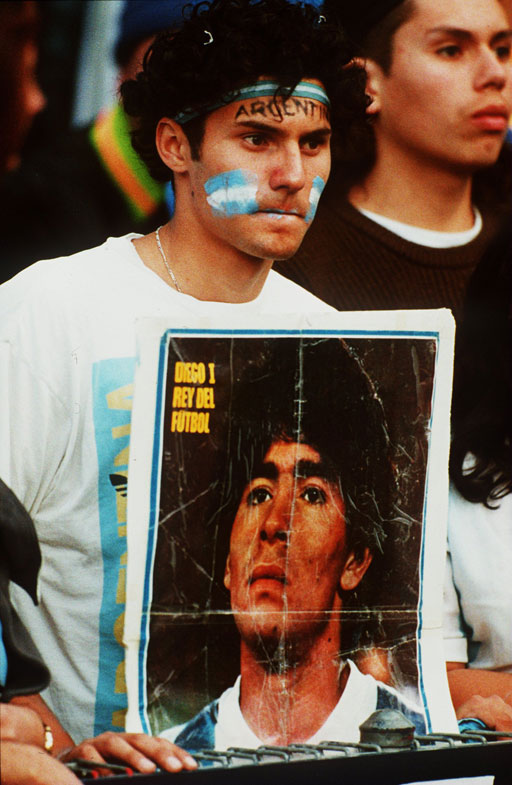
The man tasked with marking Maradona was Wade, and the skipper did his best to psyche out the star in the tunnel as both teams walked out.
Wade told Football National Radio in 2018 he whispered "happy birthday" to Maradona.
"He gave me a look which said 'you're kidding me'," Wade said.
"It made me feel better it took away the stress because he shook my hand and I thought 'I've just made you human'.
"The worst part is getting changed and standing there looking at him in the tunnel trying to look tough."
Australia pressured the South Americans continuously with the home side awarded several corners but came away empty.
Slater made an impression on the right wing making several key runs down the flank while Zelic was creative in the midfield.
Wade did his best to shut down the magician and cancelled him out for most of the game until Maradona stole the ball off Australian defender Milan Ivanovic and crossed to Argentine striker Abel Balbo to give Argentina the lead.
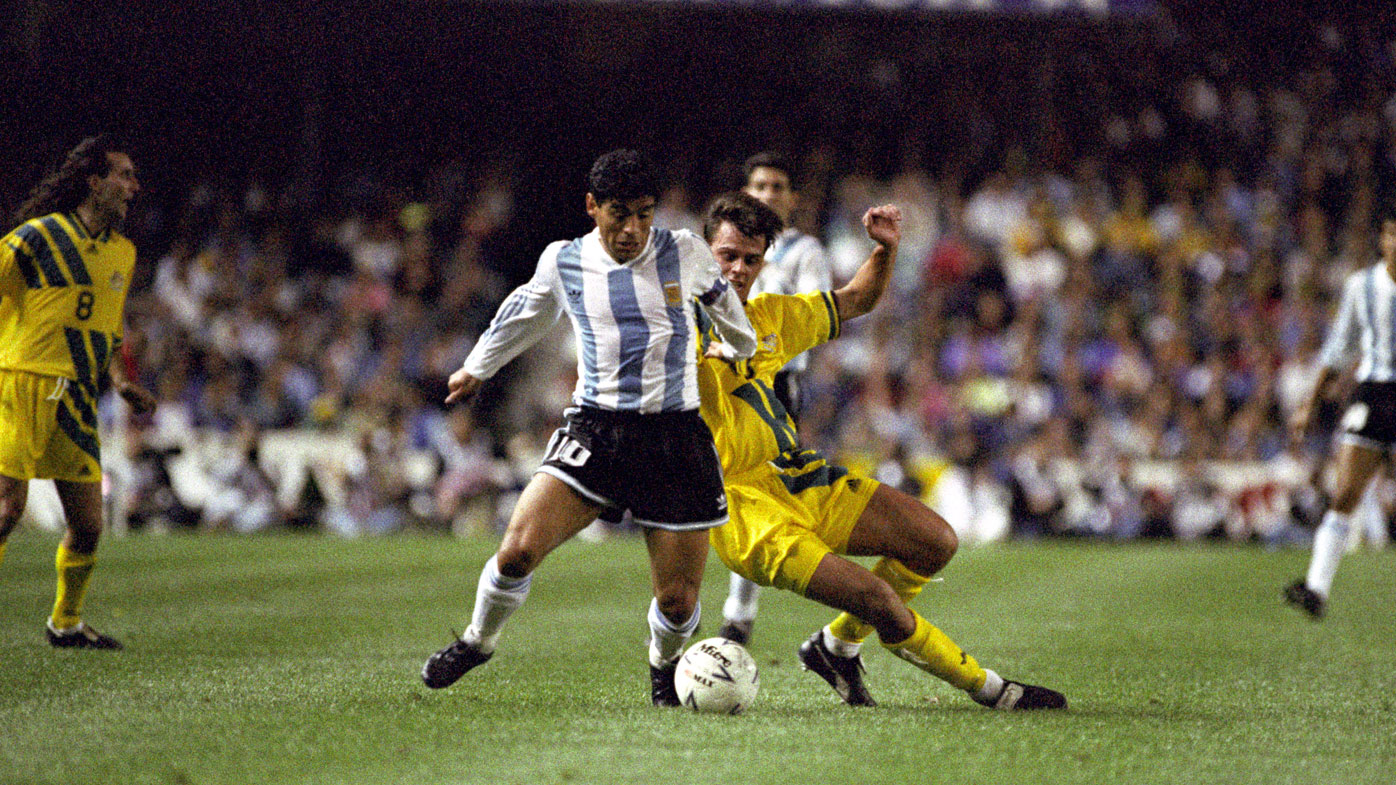
The Socceroos came back when Zelic combined with Tony Vidmar who crossed it in from the right wing for his brother Aurelio to score the equaliser. The match finished 1-1 with the Argentinians walking away with the crucial away goal.
While Vidmar scored the equaliser, the performance of wingman Slater was undeniable - even to Maradona.
The football legend told media after the game, the Australian, who was playing in France at the time, "should be playing with the millionaires in Italy" and swapped jerseys with him after the game.
"Sportsmen have games where they can play forever, that was my night probably the greatest game of my career came at the SFS in 1993," Slater told Ben Fordham on Nine's Radio 2GB this morning.
"Because of the way he spoke about me, in the next two weeks it got me away from France.
"He said I should be playing with the millionaires in Italy. Unfortunately I didn't go there I went to England to play for the Blackburn Rovers where I did win a Premier League.
"But that was down to his words. The phone rang hot when I got back from those games from agents all over Europe.
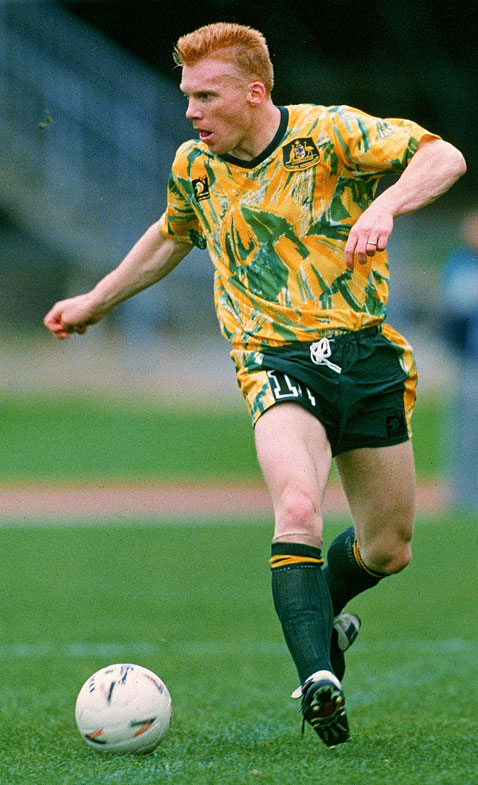
Slater said swapping his jersey with Maradona didn't happen the conventional way like you see players approaching rivals on the field after fulltime.
"I was going up the tunnel and his wife Claudia at the time was sitting where the reserves sat at the old SFS, and someone said in perfect English 'Claudia wants your shirt'.
"I said 'what do you mean?' and then I look up and see this blonde lady, and she's pointing at me for my shirt. So I thought I can't say no to Maradona's wife.
"So I took my shirt off at the base of the tunnel and I handed it to her and walked up the tunnel with no shirt. All the other players had swapped jerseys with the Argentina players and I was left with no shirt.
"I tried to explain but they laughed me down. Ten minutes later I was summoned into the other dressing room and Maradona pinched me on the cheek and said a few words in Argentinian and passed me his shirt."
The Socceroos' spirited World Cup challenge came to a cruel end 18 days later when Argentina edged out a 1-0 victory in the final play-off match in front of 100,000 fans in the Argentinian capital.
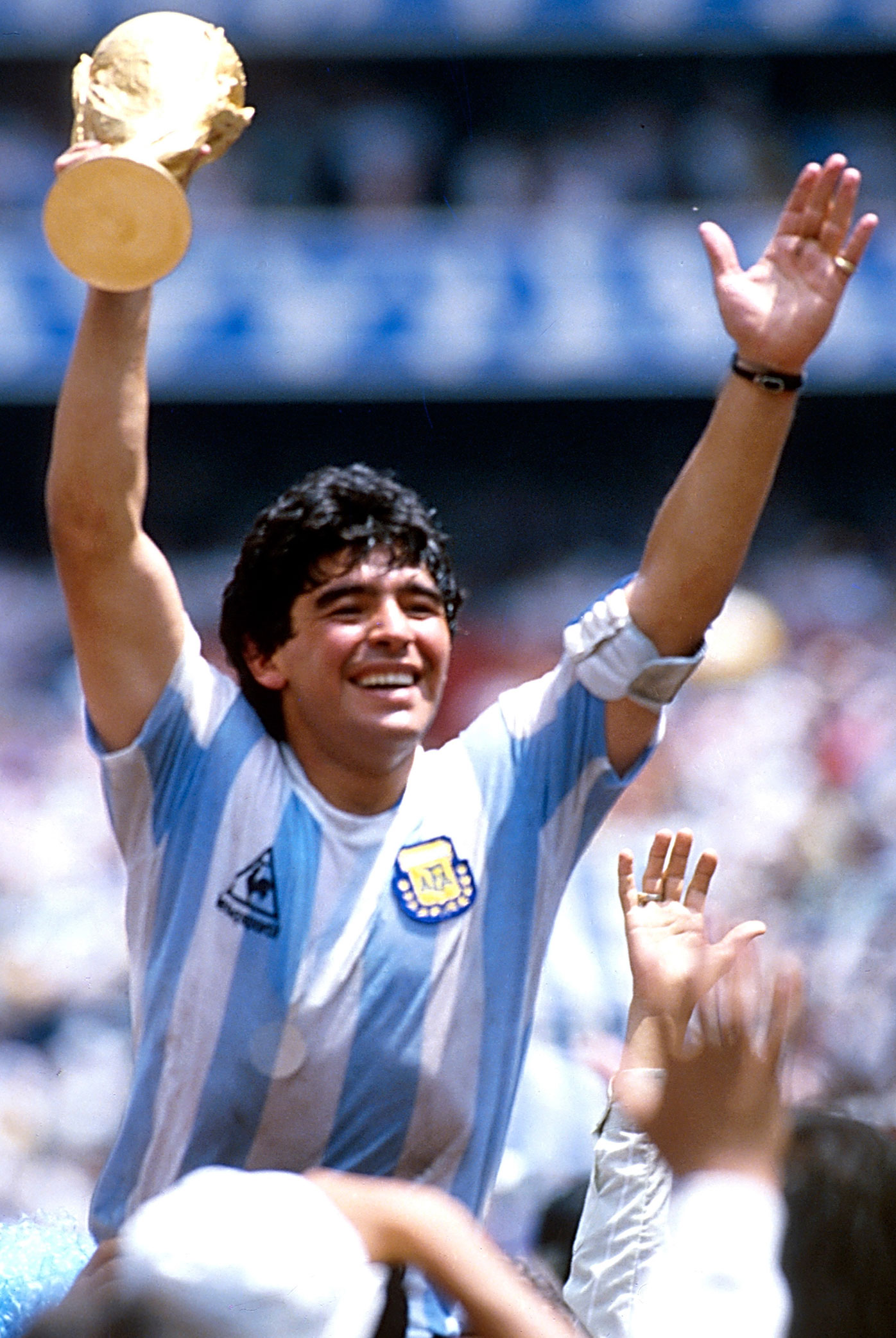
A Gabriel Batistuta cross deflected off the outstretched leg of Alex Tobin and sailed over Robbie Zabica in the Australian goal - first-choice goalkeeper Bosnich was injured for the return clash - to give the home side the World Cup qualification they so eagerly desired.
Years later, in another sensational example of his unpredictability on and off the pitch, Maradona claimed he and his teammates took banned drugs before their play-off against the Socceroos in a hasty attempt to qualify for the World Cup.
He made the claims on Argentine TV in 2011, accusing FIFA vice-president Jilio Grondona, the head of Argentina's Football Association, of knowing about the scandal.
"Why weren't there any anti-doping controls in the match with Australia if we had them in all the other games?" Maradona asked.
"They give you 10 anti-doping controls and only the match that decides whether Argentina will go to the United States or not, there is no anti-doping control. That's the cheat and Grondona knew about it.
"What happened is that to play against Australia we were given a speedy coffee. They put something in the coffee and that's why we ran more."
And so the Socceroos and Australia got the full Maradona experience in that one week brush with greatness: at times unplayable on the pitch, controversial to the point of being shocking off it.
from WWOS https://wwos.nine.com.au/football/diego-maradona-death-socceroos-vs-argentina-1993-world-cup-qualifier-tribute/3bee93bf-a2eb-4068-a61d-6e89f42aa9cc


0 Comments